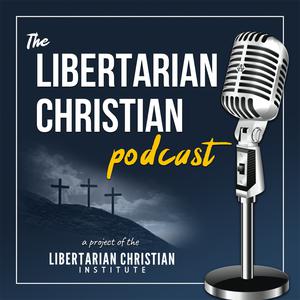
The Libertarian Christian Podcast
Libertarian Christian Institute
- 36 minutes 53 secondsEp 387: The Battle for Bonhoeffer, with Stephen Haynes
Host Cody Cook engages in a thought-provoking dialogue with Dr. Steven R. Haines, professor in the Department of Religious Studies at Rhodes College and author of the critically acclaimed book, The Battle for Bonhoeffer: Debating Discipleship in the Age of Trump.
The conversation covers Bonhoeffer's complex writings, produced under the existential strains of Nazi Germany, and explores how his steadfast opposition to Nazism has been invoked in contemporary political landscapes--particularly by politically conservative evangelicals like Eric Metaxas. Haines and Cook examine the varied political utilizations of Bonhoeffer’s work and the potential misconceptions that come with his broad appeal.Listeners will gain insights into Bonhoeffer’s controversial involvement in the assassination plot against Hitler, his concept of "religionless Christianity," and his nuanced peace ethic that challenges both pacifism and violence. They also discuss how Bonhoeffer's commitment to social justice exemplifies the intersection of the Gospel and aiding those oppressed by state actions.
Join us for this insightful episode as we unpack the legacy of Dietrich Bonhoeffer and explore what it means to be a disciple in challenging times.Audio Production by Podsworth Media - https://podsworth.com
★ Support this podcast ★20 December 2024, 10:00 am - 43 minutes 41 secondsEp 386: Exploring Faith Through Film, with Abby Olcese
Host Doug Stuart sits down with renowned film critic and author Abby Olcese to explore the intricate intersections of film, faith, and the liturgical calendar. Abby's new book, Film for All Seasons: Experiencing the Church Year at the Movies, forms the crux of this stimulating discussion, inviting listeners to see movies as more than mere entertainment but as avenues for spiritual and cultural introspection.
The conversation begins with a delightful nod to the upcoming Paddington 3, encouraging listeners to revisit the first two charming installments. Abby then introduces Joyeux Noel, bringing a poignant cinematic portrayal of the World War I Christmas truce into the fold. This sets the stage for a deeper dive into the themes of Lent, where Abby explains her thoughtful selection of films like "Annihilation" and "Groundhog Day" to navigate through themes of mortality, repentance, and self-awareness.
As Doug shares his fascination with liturgical rhythms and their underappreciation in American low church traditions, Abby enriches the dialogue with insights from her church background, reflecting influences from her time as an Episcopal ministry intern. They bond over the transformative power of films such as Guardians of the Galaxy and Fast and Furious 6 in embodying ecclesiastical themes of diversity and unity, particularly resonating with the spirit of Pentecost.
Exploring the evolving landscape of film criticism, Abby passionately argues for the importance of historical context in understanding movies. A robust discussion unfolds around how classic films like Top Gun and Night of the Hunter reflect societal attitudes of their times, paralleling her views on the lasting influence of well-crafted narratives.
The show takes an intriguing turn as Doug and Abby delve into contemporary television's shift towards streaming, critiquing the impact of immediate performance metrics on long-form storytelling. They appreciate the quality and richness of limited series on platforms like Apple TV, using Blackbird and Bad Monkey as exemplary cases.
Abby’s narratives come full circle as she illustrates how films can serve as spiritual reflections for themes churches might miss, inspiring hope, love, and inclusivity. This episode is a treasure trove for listeners, whether cinephiles, faith-seekers, or both, offering unique perspectives on how movies like Paddington, The Last Jedi, and The Bishop's Wife can enrich one's spiritual journey.
★ Support this podcast ★
Audio Production by Podsworth Media - https://podsworth.com6 December 2024, 10:00 am - 50 minutes 50 secondsEp 385: Books to Buy this Holiday Season
In this special holiday episode of the Libertarian Christian Podcast, host Doug Stuart is joined by guests Cody Cook and Alex Bernardo to discuss the must-read books to add to your shopping list this season. Whether you're looking for fiction, theology, or social commentary, we’ve got you covered!
Doug's Selections:
- Faithful Politics, by Miranda Zapor Cruz
- Letters to my Palestinian Neighbor, by Yossi Klein Halevi
- The Ferryman, by Justin Cronin
- Outlive: The Science and Art of Longevity, by Peter Attia
Cody's Selections:
- By Water: The Felix Manz Story, by Jason Landsel, Sankha Banerjee, et al
- Losing Our Religion, by Russell Moore
- How to Be an Antiracist, by Ibram X. Kendi (not recommended)
- The End of Race Politics, by Coleman Hughes
- Hutterite Confession of Faith, by Peter Riedemann
- Sin and Its Remedy in Paul, edited by Nijay Gupta & John K. Goodrich
- Paul and the Language of Faith, by Nijay Gupta
Alex's Selections:
- Jesus and his Promised Second Coming, by Tucker Ferda
- The Ethics of Money Production, by Guido Hülsmann
- A Theory of Capitalism and Socialism, by Hans-Hermann Hoppe
Audio Production by Podsworth Media - https://podsworth.com
★ Support this podcast ★22 November 2024, 10:00 am - 48 minutes 27 secondsEp 384: CBDCs and Liberty: Aaron Day's Insights on Financial Freedom and Alternative Currencies
Doug Stuart chats with Aaron Day, a seasoned entrepreneur, investor, advisor, author, and political activist with nearly three decades of experience across various cutting-edge sectors. Aaron, who is a fellow at the Brownstone Institute and Chairman/CEO of the Daylight Freedom Foundation, shares his journey through the liberty movement and his experiences that shaped his critical stance on Central Bank Digital Currencies (CBDCs).
Aaron details three pivotal radicalizations in his life, starting with his exposure to the crony nature of venture capital, the devastating impact of government regulations on his healthcare company, and his involvement with the Free State Project that led him towards cryptocurrency and blockchain as tools for resisting centralized control.
The discussion takes a deep dive into the current threat posed by CBDCs, how they could usher in a global social credit system, and limit financial competition. Aaron warns of the erosion of freedoms through increased financial surveillance and control, advocating for the use of alternative currencies like cryptocurrency, gold, and silver to maintain financial sovereignty. He emphasizes a DIY approach to financial independence, discussing practical steps in adopting cryptocurrencies and gold-backed debit cards.
The episode also explores the problematic nature of venture capitalism, revealing its reliance on taxpayer money and political connections, which Aaron argues distorts true capitalist ideals. He scrutinizes the current financial regulatory system, highlighting how it restricts investment opportunities to the wealthy and protects established interests.
Aaron also touches on the concept of a single global currency backed by energy credits, linking it to broader trends in financial control and environmental agendas. His analysis offers a sobering view on the future of financial systems and the critical need for vigilance and noncompliance.
Audio Production by Podsworth Media - https://podsworth.com
★ Support this podcast ★8 November 2024, 10:00 am - 40 minutes 17 secondsEp 383: Inside the Making of a Study Bible, with Preston Sprinkle
Host Doug Stuart delves into the fascinating world of study Bibles with returning guest Preston Sprinkle, a New York Times bestselling author and host of the Theology in the Raw podcast. Join us as we explore the innovative process behind the creation of the "Upside Down Kingdom Bible," a study Bible that merges traditional biblical scholarship with contemporary sociopolitical issues.
Preston reveals the evolution of study Bibles, highlighting a shift from detailed footnotes on every verse to extended sidebars focused on fewer passages, a style that's gaining traction among younger generations like millennials and Gen Z. Although he admits a preference for the traditional footnoted approach, Preston recognizes the market trend towards engaging sidebars and essays of over 300,000 words in study notes, covering essential themes such as leadership, power, science, wealth, poverty, sexuality, gender, and grace.
Doug and Preston dig into the challenge of translating Hebrew texts while maintaining their literary essence, debating the inclusion of themes like faith, allegiance, and the kingdom of God—crucial for a Bible focused on political insights. The episode also touches on the importance of selecting a diverse group of authors to ensure various viewpoints, which Preston emphasizes as key to the project.
The discussion further addresses the misconception that platforming different perspectives equates to endorsement. Instead, it’s about fostering dialogue and understanding, particularly in contexts of deconstructed religious beliefs. This approach is exemplified in Preston's thoughtful contributions to the study Bible on themes like sexuality, gender, and grace, all while staying true to biblical integrity.
★ Support this podcast ★
Audio Production by Podsworth Media - https://podsworth.com25 October 2024, 9:00 am - 47 minutes 32 secondsRe-Issue: Ep 263: Rival Nations, with Peter Rollo
Peter Rollo, founder of the website Rival Nations, joined us to discuss his growth as a believer, passion for theology, why he started Rival Nations, "Two-Kingdom Theology," Romans 13, voting as a form of violence, and what it means to be a citizen of a "rival nation." Followers of Jesus are indeed a part of a nation: The Kingdom of God.
(Re-Mastered for Re-Issue.)
Audio Production by Podsworth Media - https://podsworth.com
★ Support this podcast ★18 October 2024, 9:00 am - 39 minutes 20 secondsEp 382: Can an Illegal Immigrant be Ordained?
Doug Stuart sits down with guests Norman Horn and Cody Cook to delve into one of the most complex and nuanced discussions facing the modern church—whether undocumented immigrants can biblically serve as elders.
Cody Cook explains how Christian theology provides a balanced view, acknowledging legitimate functions of government while urging respect for authority within reasonable boundaries, much like Apostle Paul's approach.
Pivoting to the specific issue of church leadership, Doug Stuart explores the criteria for evaluating pastoral candidates. Should undocumented status automatically disqualify someone, or does the context and community's understanding of the individual's circumstances matter more? Doug advocates for a nuanced approach that values wisdom and moral evaluation over rigid legality.
Norman Horn emphasizes that decisions regarding church discipline and leadership must involve the community. He insists that wise elders, with the support and awareness of the congregation, should navigate these complex issues.
The discussion broadens to encompass the church’s role in making decisions amidst uneasy societal frameworks. The speakers propose that even when laws appear unjust, decisions must align with a faithful interpretation of scripture and involve comprehensive community input. They reflect on practical scriptural interpretations, urging congregations not to adopt superficial readings but to seek genuine understanding and unity.
The episode further traverses the intricacies of church governance, reflecting on different models from elder-led structures to other forms practiced in various denominations. The conversation acknowledges the historical context, drawing parallels to Dietrich Bonhoeffer and underground churches, suggesting practical solutions like lay leadership to navigate legal and ethical challenges.
Disclaimer: The Libertarian Christian Institute does not provide legal advice. The discussion focuses on ethical and religious perspectives and aims to offer thoughtful considerations for congregational decision-making.
Audio Production by Podsworth Media - https://podsworth.com
★ Support this podcast ★11 October 2024, 9:00 am - 24 minutes 24 secondsBonus Episode: Should Christians Help Rescue the Republic? (Uncut Audio)
Covering from the National Mall in Washington, D.C., this gathering under the banner "Rescue the Republic," brought together a remarkable coalition of individuals united by a common concern for the future of America.
Doug Stuart, Jacob Winograd, and Matthew Bellis had the privilege of being on the ground to capture the electrifying atmosphere and engaging conversations.The event, orchestrated by founders Angela McArdle, Bret Weinstein, and Matt Tune, was a confluence of diverse voices including rock stars, comedians, actors, philosophers, and politicians from different backgrounds and political affiliations—Democrats, Republicans, Libertarians, and Independents.
Key figures like Russell Brand, John Cooper, Pete Parada, and Matt Taibbi shared their perspectives on issues ranging from civil liberties and freedom of speech to the impact of big tech and government transparency. A surprising thread woven throughout the rally was a focus on faith in God, highlighting a unique blend of social and spiritual concerns.
In this episode, you'll hear powerful testimonials from attendees who traveled from afar to express their hopes and fears concerning the republic.We'll also delve into the complexities of unity among such varied ideologies and explore the critical question at hand: Should Christians be actively involved in political endeavors to preserve the republic?
Join us as we reflect on the day's events, the inspiring messages from multiple stages, and the poignant interviews that echo the urgency of our times.
Watch cut version on YouTube: https://youtu.be/XnY1du1Y4A8
★ Support this podcast ★
Watch uncut version on Rumble: https://rumble.com/v5hjywl-uncut-should-christians-help-rescue-the-republic.html
View full interviews here: https://www.youtube.com/playlist?list=PLcrgOPKyFx3afC56ZQRiqfZrCHAr9Mmhd5 October 2024, 2:45 pm - 1 hour 1 minuteRe-Issue: Ep 207: Jesus Politics, with Kurt Willems
Kurt Willems of the Theology Curator podcast joins us to talk about why Jesus was political, how Jesus did politics, and how the church today can follow in the footsteps of Jesus when living publicly. Kurt also gives us his feedback on LCI’s latest book, Faith Seeking Freedom.
(Re-Mastered for Re-Issue.)
Audio Production by Podsworth Media - https://podsworth.com
★ Support this podcast ★4 October 2024, 9:00 am - 48 minutes 6 secondsEp 381: Biblical Interpretation and Ethnic Diversity: Insights from Amy Peeler
Doug Stuart is joined by Amy Peeler, Kenneth T. Wessner Chair of Biblical Studies at Wheaton College and Associate Rector at St. Mark's Episcopal Church, to delve into the rich and diverse perspectives of The New Testament in Color. This multi-ethnic Bible commentary, co-edited by Peeler, aims to encompass the voices and interpretations of a diverse group of contributors who bring their unique cultural and ethnic backgrounds to the forefront of biblical exegesis.
Peeler discusses the origins of the project, inspired by Esau McCauley's Reading While Black, and the collaborative process that made this inclusive volume possible. The episode explores the necessity and value of incorporating diverse perspectives in theological study, emphasizing how different cultural backgrounds can reveal unique insights that enhance our understanding of scripture.
Doug and Amy also touch on the impact of one's lived experiences on scriptural interpretation, drawing analogies to multi-ethnic Bible studies and the importance of community and inclusivity in Christian faith. Amy shares her reflections on her academic work, including her dissertation on Hebrews and her book Women and the Gender of God, while also addressing the broader implications of ethnic diversity within church communities.
Tune in as our speakers navigate the challenges and rewards of multi-ethnic collaboration in biblical commentary, the essence of maintaining scriptural authority, and the ongoing effort to foster unity within the church by embracing ethnic differences. This episode is a must-listen for anyone interested in the intersection of faith, culture, and community.
Key topics discussed:- The genesis and goals of "The New Testament in Color"
- The importance of diverse perspectives in biblical interpretation
- Reflections on Amy Peeler's academic work and its contribution to the project
- Challenges and successes in creating a multi-ethnic commentary
- The role of inclusivity and community within the Christian faith.
Join Doug Stuart and Amy Peeler for a profound discussion that seeks to expand the horizons of biblical understanding and encourage an inclusive approach to faith and theology.
★ Support this podcast ★
Audio Production by Podsworth Media - https://podsworth.com27 September 2024, 9:00 am - 54 minutes 36 secondsEp 380: Faithful Politics, with Miranda Cruz
Host Doug Stuart sits down with Miranda Zapor Cruz, a distinguished Professor of Historical Theology at Indiana Wesleyan University, to explore the intricate relationship between faith and politics. Miranda's new book, Faithful Politics: 10 Approaches to Christian Citizenship and Why It Matters, lays the groundwork for a comprehensive discussion on how Christians can navigate their dual citizenship—as citizens of the Kingdom of God and participants in earthly political systems.
Miranda articulates the historical and theological roots of various Christian political approaches, from the Social Gospel's left-leaning ambitions to Calvinist dominionist principles. The conversation also touches on the nuanced concepts of principled pluralism, separationist approaches, and the implications of defining Christian nationalism too broadly.
Listeners will gain insightful perspectives on how different Christian traditions engage with political responsibilities—whether through fervent societal transformation or steadfast separation. Miranda also brings a global lens to the discussion, comparing American Christians' relative ease of practice with the severe challenges faced by believers in oppressive regimes.
Join us for an engaging episode that not only critiques contemporary political discourse but also provides a pathway for Christians to think critically and faithfully about their political involvement. Don’t miss Miranda's thoughtful reflections on the importance of scripture's holistic narrative for guiding political engagement and the nuanced definitions of freedom in the Kingdom of God versus the United States.
★ Support this podcast ★
Audio Production by Podsworth Media - https://podsworth.com13 September 2024, 6:44 pm - More Episodes? Get the App
Your feedback is valuable to us. Should you encounter any bugs, glitches, lack of functionality or other problems, please email us on [email protected] or join Moon.FM Telegram Group where you can talk directly to the dev team who are happy to answer any queries.
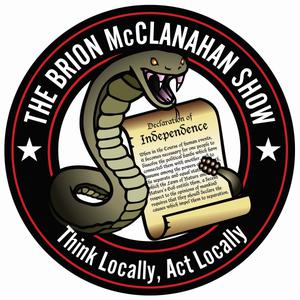 The Brion McClanahan Show
The Brion McClanahan Show
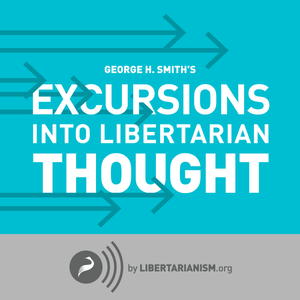 Excursions into Libertarian Thought
Excursions into Libertarian Thought
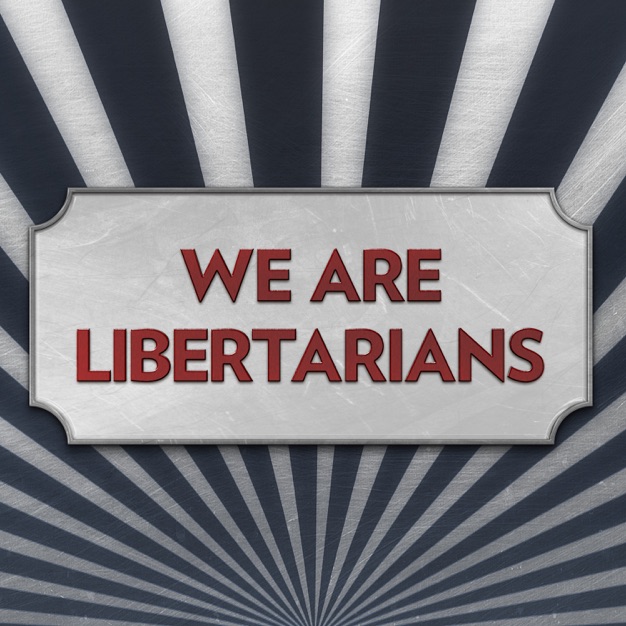 We Are Libertarians
We Are Libertarians
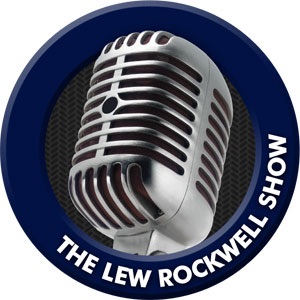 Podcasts – LewRockwell
Podcasts – LewRockwell